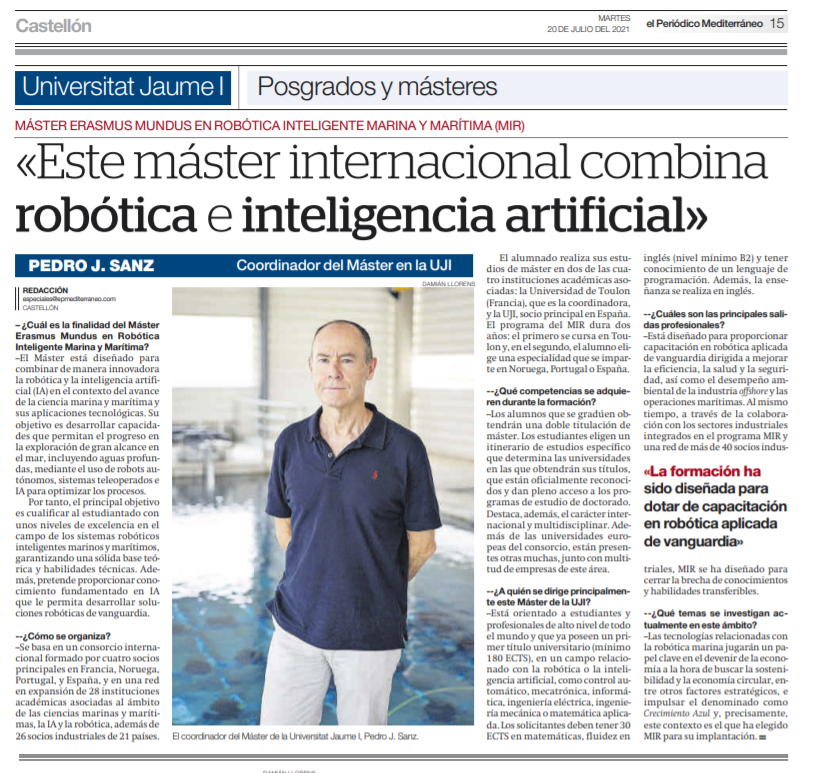Pedro J. Sanz, MIR local coordinator in UJI, Spain, answered the questions of the newspaper Periódico Mediterráneo of Castellón (Spain) https://www.elperiodicomediterraneo.com/ about the MIR Master’s Degree. His interview was written by especiales@epmediterraneo.com and published on July 20, 2021.

English translation of the article by Célia Cau
“What is the purpose of the Master Erasmus Mundus in Marine and Maritime Intelligent Robotics?
The Master is designed to combine in an innovative way robotics and artificial intelligence (AI) in the context of advancing marine and maritime science and its technological applications. Its aim is to develop capacities that will enable progress in long-range exploration in the sea, including deep waters, through the use of autonomous robots, teleoperated systems and AI to optimise processes. Therefore, the main objective is to provide students with levels of excellence in the field of marine and maritime intelligent robotic systems, guaranteeing a solid theoretical basis and technical skills. In addition, it is intended to provide a foundation of knowledge in AI to enable it to develop cutting-edge robotic solutions.
How is it organised?
It is based on an international consortium made up of four main partners in France, Norway, Portugal and Spain, and in an expanding network of 28 academic partners in the fields of marine and maritime sciences, AI and robotics, as well as 26 industrial partners, from 21 countries.
Students undertake their Master’s studies at two of the four academic partner institutions: the University of Toulon (France), which is the coordinator, and the UJI, the main partner in Spain.
The MIR programme lasts two years: the first year takes place in Toulon and, in the second year the student chooses a speciality taught in Norway, Portugal or Spain.
What skills are acquired during the training?
Students who graduate will obtain a double degree of Master’s degree. Students choose a specific study track which determines the universities from which they will obtain their degrees, which are officially recognised and give full access to doctoral study programmes. The international and multidisciplinary nature of the programme is also noteworthy. In addition to the European universities in the consortium, many others are present, along with a multitude of companies in this area.
To whom is this UJI Master’s Degree mainly directed?
It is addressed to students and high-level professionals from all over the world and who already have a first university degree (minimum 180 ECTS), in a field related to robotics or artificial intelligence, such as automatic control, mechatronics, computer science, electrical engineering, mechanical engineering or applied mathematics. Applicants must have 30 ECTS in mathematics, fluency in English (B2 level minimum) and have knowledge of a programming language. Furthermore, teaching is conducted in English.
What are the main career opportunities?
It is designed to provide training in applied robotics cutting-edge aimed at improving efficiency, health and safety, as well as environmental performance of offshore industry and maritime operations. At the same time, through collaboration with the industrial sectors integrated in the MIR programme and a network of more than 40 industry partners, MIR is designed to bridge the gap of knowledge and transferable skills.
What topics are currently being researched in this area?
Technologies related to marine robotics will play a key role in the future of the economy when it comes to the pursuit of sustainability and circular economy, among other strategic factors, and promote what is known as Blue Growth, and it is precisely this context that MIR has chosen for its implementation.”
